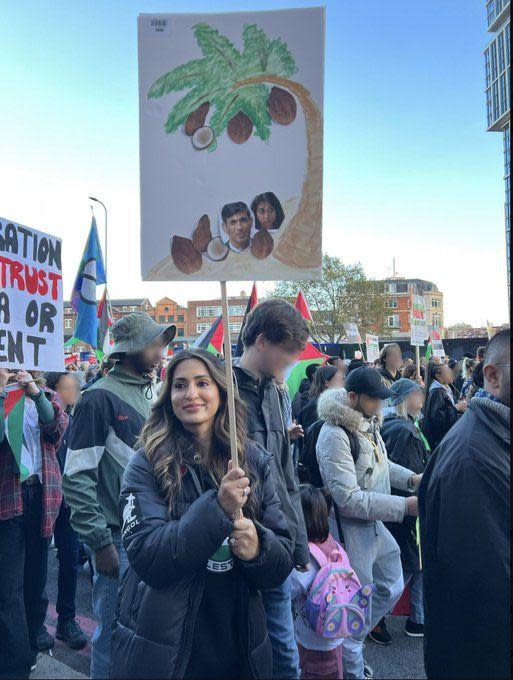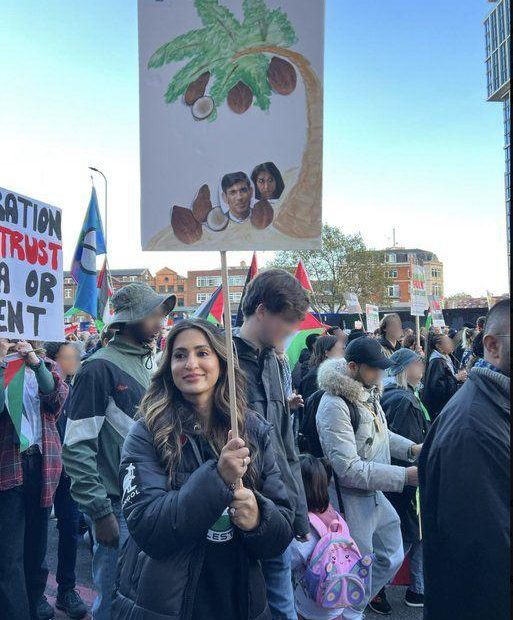Marieha Hussain had been marching with her family for three hours and the children with them were starting to get tired.
“We opened some snacks to keep them going,” she said. They were part of a group of 300,000 at a pro-Palestinian demonstration in central London on November 11, 2023.
“Then someone called out from the side of the street where I was standing, 'Can I take a picture of your sign?'”
This wasn't the first time she'd been asked for a photo. Her family's placards, she said, had attracted a lot of attention.
On one side of the board was a cartoon of Suella Braverman, then Home Secretary, dressed as Cruella de Vil from 101 Dalmatians. Mrs Hussain held up the board and posed.
“The voice shouted, 'No, not that one, can you please turn it over?' – and I did.
“And that was it.”
Her story was told at Westminster Magistrates Court this week during her two-day trial on a charge of racially aggravated public order offence.
She was accused of the offence – which she was acquitted of on Friday – because of what was written on the other side of the sign.
It was a drawing of a palm tree with coconuts falling from it, and over two of the coconuts were pasted the faces of Mrs Braverman and the then Prime Minister Rishi Sunak.
Central to this case was the word 'coconut' and the question of whether it could be considered racist.


Ms Hussain told the court that on her way home from the protest she received a text from a family friend saying that her photo had been posted by an anonymous right-wing blog called Harry's Place and that it had gone viral on X (it has now been viewed more than four million times).
“It doesn't get more racist than this,” the post read. “Among anti-racists you'll find the worst racists of all.”
Below that she saw a response from the Metropolitan Police, saying they were 'actively looking for her'.
Chris Humphreys, a member of the Metropolitan Police staff who was working in the force's communications team that day, saw the post after the Met was tagged in it. “The account that posted it usually gets a significant response,” Mr Humphreys told the court. He was called to give evidence on behalf of the Crown Prosecution Service.
In the 10 months since that day, anonymous social media accounts have branded her a racist, while tabloids have published details about her family and the cost of her parents' home. Ms Hussain, 37, has also lost her job as a secondary school teacher.
After the Metropolitan Police indicated they wanted to identify Ms Hussain, she consulted lawyers and voluntarily turned herself in to a police station three days later, on November 14, she told the court.
There she gave those present a prepared statement explaining who she was, what had happened that day and why she had put up the sign.
“I am a professor with almost 10 years of experience and an academic background in psychology,” she wrote in the statement. “It is extremely difficult to convey complex, serious political statements in a nutshell, and we have done our best.”
She was not formally charged until six months later, in May this year, when she discovered she had been accused by a journalist working for Al Jazeera, she told the court.
At this point, support for Ms Hussain from activists and campaigners grew louder. When she first appeared at the Magistrates Court in June – visibly pregnant – to plead her innocence, protesters stood outside the courthouse with copycat placards saying “coconut”.
'This is our language'
The term 'coconut' is instantly recognisable to many people from the Black and Asian communities in the UK.
It is a word with a generally negative meaning and can range from light-hearted jokes to serious criticism or insults.
The court had to decide whether Ms Hussain's sign could be considered racist.
Prosecutor Jonathan Bryan argued that coconut was a known racial slur.[It has] a very clear meaning – you may be brown on the outside, but you are white on the inside,” Mr Bryan told the court.
“In other words, you are a 'race traitor' – you are less brown or black than you should be.”
According to Mr Bryan, Ms Hussain had crossed the line between legitimate political expression and racist insults.
It wasn't the first time the term 'coconut' had been in court: in 2009, Shirley Brown, the first black Liberal Democrat elected to Bristol City Council, used the term to describe Conservative councillor Jay Jethwa during a heated debate over the funding of the council's Legacy Commission.
The following year, in 2010, Ms Brown was convicted of racial harassment over her remark. She was given a 12-month suspended ban and ordered to pay £620 in costs. Mr Bryan referred to Ms Brown's case during this week's trial.
One of the people who has been particularly ardent in supporting Ms Hussain is the writer and anti-racism activist Nels Abbey.
“The word ‘coconut’ did not fall from a coconut tree, to quote Kamala Harris’ mother,” Mr. Abbey told me after the first day of the trial, adding that the word “fell from our experience as formerly colonized people.”
The term emerged as a way to criticize those who “collaborated with our oppressors,” he said.
“This is our language,” he said. “We share this language because we share a history, we share origins, and we share a community… You cannot criminalize people’s history, and the language that came from it.”
In court this was confirmed by two academic experts on racism who gave evidence in support of Ms Hussain: Prof Gus John and Prof Gargi Bhattacharyya.
They cited postcolonial theorist Frantz Fanon, black liberation activist Marcus Garvey, the late poet Benjamin Zephaniah and comedian Romesh Ranganathan, who often joked that his mother called him a coconut because he didn't speak Tamil.
These were statements more often heard in university lecture halls than in court.
The court heard the inquiry team had also contacted three experts in racism to give evidence for the prosecution, but all had declined. One of them, Black Studies specialist Prof Kehinde Andrews, sent a “fairly lengthy response” saying the word was not a racial slur and asking for it to be shared with the CPS.
Professor John told the court he was “disappointed” that the prosecution had not called experts to support their case.
“I would have liked to be informed and educated about when coconut is a racial slur,” he said. “I would have liked to see evidence of that. I'm not aware of that at all.”
Ms Hussain wrote in her statement that “coconut” “is a common language, especially in our culture”.
When her lawyer, Mr Menon, asked her what she meant by that, she replied that she had grown up with the word being used among South Asians.
“If I'm honest, my father used to call me a coconut sometimes,” she said, prompting laughter from the public gallery.
'Political satire'
Ms Hussain also argued that her use of the term was a form of political criticism of what she described as “politicians in high office who perpetuate and push racist policies”.
On Friday afternoon, District Judge Vanessa Lloyd ruled that the sign was “part of the genre of political satire” and that the prosecution “had not proven at the criminal level that there was offensive conduct”.
When the verdict was read out, there were cheers and jeers from the public gallery and Mrs Hussain burst into tears.
Outside court she said: “The damage to my reputation and image can never be undone.
“Hate speech laws should protect us better, but this trial shows that these rules are being used as a weapon to target ethnic minorities.
“It goes without saying that this ordeal has been a torment for my family and me. Instead of enjoying my pregnancy, I have been vilified by the media, lost my career and been dragged through the legal system.”
But, she said, “I am more determined than ever to continue to use my voice” for the Palestinians.
![]()

